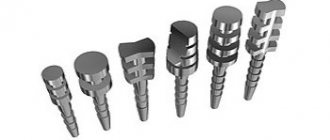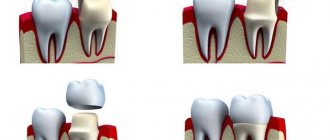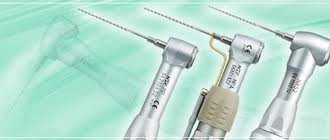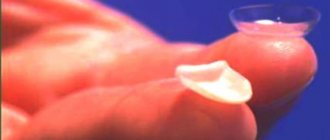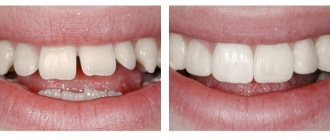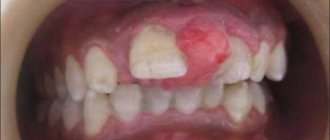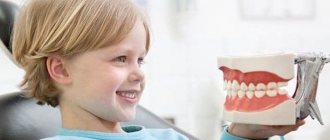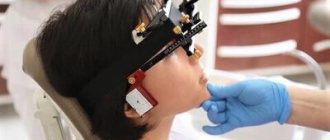Our dental clinic provides all types of dental care for adults and children.
In our clinic you can receive dental services in the following departments:
- Children's dental departments (therapeutic dentistry, surgical dentistry, pediatric emergency department).
- Anesthesiology department (treatment under general anesthesia).
- X-ray department.
- Orthodontic department.
- Department for the provision of paid services (offices of a therapist, orthodontist, orthopedist and surgeon) for children and adults.
All doctors who see adults and young patients have a certificate of the relevant specialty, and constantly improve their level of qualifications at training sites in Moscow, other cities of Russia and abroad. In our team there are two candidates of medical sciences, and if necessary, consultation with Doctor of Medical Sciences Yu. M. Malygin is possible.
Our entire team of professionals works to take care of the dental health of you and your family.
Free baby shower
The status of a children's state dental clinic allows it to accept minor patients free of charge within the framework of state guarantees under the compulsory medical insurance program. Children with a compulsory medical insurance policy are provided with all types of dental care included in the territorial compulsory medical insurance program after submitting an application and being assigned to a clinic. In this case, appointments with doctors are made through the EMIAS system.
Services not included in the territorial compulsory medical insurance program for children and all adult patients who apply to the clinic are provided on the terms of paid medical services.
Experienced dentists with specialist certificates work at children's appointments, many of them with the first and highest qualification categories.
Everything about children, everything for parents
Tweet
It's no secret that a child's healthy teeth are the result of parents' attention, daily oral care and timely professional help from a pediatric dentist.
The foundations for the proper formation and development of the chewing-speech apparatus are laid at an early age, so it is recommended to start visiting a pediatric dentist from the age of three. It is from this period that preventive treatment is required, which consists of strengthening the enamel of baby teeth and professional hygiene.
Private pediatric dentistry: pros and cons
Private dentistry, as a rule, differs from public dentistry in that it has more modern, high-quality equipment and an individual approach to each child.
Already from the first visit, the child’s impression of the clinic and the desire to visit the dentist in the future are formed. Therefore, pediatric dentists must have the necessary psychological qualities that allow them to find an approach and establish contact with each little one. The treatment process should be playful and painless.
Doctors in private clinics, as a rule, are professionals in their particular field of dentistry (bite correction, dental implantation, etc.).
Well, the disadvantage of private pediatric dentistry is the rather high cost of the services it provides. However, every year there are more and more people who prefer private clinics. And this is due to the fact that the treatment in them is carried out efficiently, quickly and painlessly.
Features of pediatric dentistry
You should contact a pediatric dentist starting with a consultation. This will help to avoid many problems in the future: the occurrence and development of caries, malocclusions, improper development of the jaw, and will help keep your teeth healthy, white and beautiful.
Consultation and preventive measures should be stress-free for the little one, as this will give a positive impression of meeting the dentist and prevent fear of dental treatment.
It is in early childhood, when the entire body is formed, that special attention should be paid to tooth growth, oral hygiene and bite formation. The time lost in childhood cannot be returned.
At what age should children's teeth be taken care of?
From the moment the first tooth appears. And in the future, you need to visit the dentist regularly, and not as an emergency.
When a child is very young and cannot brush his teeth on his own, parents should help him with this, teaching him about oral hygiene.
How to prepare a child for a visit to the dentist?
Firstly, parents themselves should calm down and behave naturally, not panic or show their fear. Secondly, try to come to your appointment a little earlier to give your baby a chance to get comfortable. Thirdly, before visiting the dentist, feed your baby so that he is not hungry. Fourthly, write down the baby at the time when, according to the schedule, he should be awake and under no circumstances sleep. Fifthly, be calm in the office and do not interfere in anything; the doctor himself must find an approach to the child.
If a child flatly refuses to treat a tooth, do not insist or force it. Reschedule your visit for another time. At home, in a calm, familiar and safe environment, talk to your baby. Explain to him how important this is and that the teeth need to be treated.
Remember that it is from the first visit to the doctor that the child’s attitude towards further visits is formed.
Visiting the dentist should not be a nightmare, but a healthy pastime.
Many parents believe that it is not worth taking special care of baby teeth, since they will fall out anyway, but the health of permanent teeth depends on their condition. In addition, some of the procedures are best performed in childhood. For example, if a child develops a malocclusion, then you should not put off installing braces, because the sooner this problem is addressed, the better.
And one more important point that I would like to draw the attention of parents to when considering the features of pediatric dentistry : under no circumstances should children be frightened by dentists. Such threats can cause fear of clinics, and it will be difficult to convince your child of the need for dental treatment.
In a good children's dental clinic, doctors try to make the visit comfortable for the child. Kind and attentive dentists will be able to distract the baby from the treatment process itself, and will make sure that the baby’s memories of the procedures are only positive.
We offer several more articles on this topic:
First teeth —
Caries of primary teeth: treatment, prevention, symptoms —
Caring for children's teeth —
Children's toothbrushes - features of choice —
Don't miss interesting articles:
Paid services in a state dental clinic
Paid medical services are provided to adults and children in accordance with the list of medical activities specified in the license. There is an appointment by phone: + 74991489145 and directly on the day of reception at the reception of paid services. Dental care is provided in the following sections:
1. Pediatric dentistry (Compulsory Medical Insurance + PMU).
2. Therapeutic dentistry (PMU).
3. Dental surgery (including OMS+PMU implants).
4. Orthodontics (CHI + PMU).
5. Radiology of the maxillofacial area (OMS + PMU).
6. Anesthesiology and resuscitation (sanitation of the oral cavity under anesthesia) (CHI + PMU).
7. Prevention of oral diseases (CHI + PMU).
8. Orthopedics (PMU).
An agreement is concluded with each patient who applies for the provision of paid medical services; payment for the doctor’s work is carried out through the cash desk with the subsequent issuance of a cash receipt and receipt. All medical work is recorded in the medical history.
Adult appointments in our dental clinic are provided only on a paid basis. We do not divide patients into paid and free, and doctors are equally attentive to everyone who comes to us. In this we are no different from a private dental clinic.
NeoStom – Dentistry website
1. Children's dental clinic —a medical and preventive institution whose activities are aimed at the prevention of dental diseases, timely detection and treatment of children with diseases of the maxillofacial area.
2. A children's dental clinic is organized in the prescribed manner and operates among children under the age of 14 inclusive, paying special attention to the improvement of children's organized groups.
3. The boundaries of the area of operation of the clinic and the list of organizations are established by the health authority according to the subordination of the clinic.
4. The main objectives of the children's dental clinic are:
a) carrying out activities for the prevention of diseases of the maxillofacial area among the child population, in schools and other organized children's groups;
b) organization and implementation of activities aimed at early detection of children with diseases of the maxillofacial area and their timely treatment;
c) provision of qualified outpatient dental care to the children's population.
5. To carry out its main tasks, the children's clinic organizes and conducts:
- in a planned manner, according to schedules agreed upon by school directors and leaders of children's groups, preventive examinations of children with simultaneous treatment of identified patients;
— implementation of complete sanitation of the oral cavity for all children visiting the clinic for dental care;
— providing emergency medical care to sick children with acute diseases and injuries of the maxillofacial area;
— dispensary observation of certain groups of dental patients;
— provision of qualified outpatient dental care with timely hospitalization of children in need of inpatient treatment;
— the whole complex of rehabilitation treatment of pathologies of the maxillofacial area and, above all, dental prosthetics and orthodontic treatment;
— introduction of modern diagnostic and treatment methods, new medical equipment and equipment, medicines;
— sanitary and educational work among the population with the involvement of the public, the Red Cross and Red Crescent Society and the use of all media (print, television, radio broadcasting, etc.);
— activities to improve the qualifications of doctors and nursing staff.
6. To carry out planned preventive and therapeutic measures in organized children's groups, the clinic uses the premises provided for these purposes in the specified organizations, as well as dental offices (in schools with a student population of 800 or more).
7. The pediatric dental clinic may include::
— departments of therapeutic and surgical dentistry;
— orthodontic department;
— auxiliary departments (x-ray, physiotherapy rooms);
- registry;
— administrative and economic part;
- accounting.
The specific structure of the clinic is established by the health authority according to subordination.
8. The clinic is equipped with medical equipment, instruments, hard and soft equipment, and household property in accordance with the current report card.
9. The subordination of the children's dental clinic is determined in accordance with the established procedure.
10. The administration of the children's clinic, together with public organizations, establishes internal labor regulations.
11. The direct management of the children's dental clinic is carried out by the chief physician of the clinic, whose rights and responsibilities are determined by the relevant regulations.
12. The operating hours of the clinic are established by the health authority according to subordination, taking into account the needs of the population and specific conditions.
13. A public council is organized at the children's dental clinic, which carries out work in accordance with the current regulations.
14. A medical council is created under the head physician of the children's dental clinic.
15. The clinic operates according to plans that provide for specific organizational, treatment and preventive measures.
16. The children's dental clinic enjoys the right of a legal entity and has a round seal and stamp.
17. The staffing schedule of a children's dental clinic is established according to current and standard staffing standards.
Organization of medical and preventive care for children
Children's health is protected by a network of children's hospitals (city, regional, regional, republican), children's clinics, children's departments of general hospitals, children's sanatoriums (local and republican significance), seasonal health institutions (summer children's camps), nurseries, kindergartens, orphanages , forest schools, children's dental clinics, dental offices at children's clinics, schools, vocational schools, preschool institutions, etc. Dairy kitchens provide children with special types of food.
Many central district hospitals have children's clinics and children's inpatient departments, and rural district hospitals have children's clinics or outpatient clinics.
Caring for children's health begins before the child is born and continues throughout childhood. Basic principles of organizing medical care for children: preventive focus, continuity in the work of all institutions providing medical and preventive care to women and children, phasing.
You might be interested in:
- Organization of the work of the orthodontic department
- History of the formation of dental care in Russia
- Types of dental institutions. Management and coordination of dental care for the population. Forms and methods of work of the chief dentist (district, region, city)
- Accounting and reporting documentation of dental institutions. Qualitative and quantitative indicators in the activities of dental services
- Centralized and decentralized rehabilitation method
Related materials:
- Organization of inpatient care for dental patients
- Organization of orthopedic care for the population
Benefits of paid dental appointments
A paid appointment at a state dental clinic means the most modern materials and treatment methods, and the latest generation equipment. In these basic requirements, we are completely competitive with private dental clinics. And in terms of material and technical equipment, private dentistry remains far behind:
- 45 dentists, surgeons and orthodontists see patients in 25 modern offices.
- Our own training base keeps our doctors in professional shape.
- Our own technical laboratory, which employs 9 dental technicians, allows us to minimize the time required for prosthetics and preparation for orthodontic treatment.
- The best technical base for sterilization measures in Moscow guarantees your safety during treatment.
Adult and children's appointments are carried out only by highly specialized specialists who solve exactly your problem. Our dental clinic has been providing its services since 1968. The children of our patients already bring their children to us for treatment - such trust and reputation are worth more than any advertising. Treatment with us is inexpensive, smiling at your loved ones is priceless!
Make an appointment with a dentist for a fee using the electronic registration form
or by phone: + 7(499)148-18-09.
New technologies in dental prosthetics - what is available in Russia. New products in pediatric orthodontics
We are all direct witnesses of the active and rapid introduction of the most innovative developments in science, technology and technology into our lives. We use ideas and things that seemed like distant science fiction 20-30 years ago every day and don’t even think about it. new technologies in dental prosthetics are developing by leaps and bounds . Now not only effective methods of preserving natural teeth are available, but also unique opportunities to restore the dentition in ideal form. It's no longer a secret that most public people who shine with their perfect smiles have them only thanks to the latest achievements of dental science.
Modern technologies of dental prosthetics
Moreover, the strategy and tactics of orthopedic treatment of the dental system have also changed. Now you can forget about the terrible drills and scary guys with pincers. Modern technologies for dental prosthetics are conservative, gentle, aesthetically oriented, precision (high-precision) treatment methods. Which offer methods that are more convenient than traditional crowns and bridges. And mainly due to the durability and biocompatibility of prosthetics. It's no secret that almost a third of metal and metal-ceramic dentures were removed due to allergies to them or the occurrence of galvanic reactions in the oral cavity.
In addition, the need for long-term grinding of teeth with mandatory anesthesia, which is often simply not perceived by patients, as well as the poor light transmission of metal-ceramic dentures - simply put - it is clear that these are fake teeth. Plus, their service life is not very long (on average 10 years), as well as the design flaws of metal prostheses make them less in demand in comparison with new technologies in dental orthopedics. Moreover, today there are less traumatic (invasive) methods of treating, preserving and restoring teeth.
Methods of treatment, preservation and restoration of teeth
The first thing that should be mentioned is computer modeling of the manufacture of dental prostheses. Previously, dentures were made by hand, so there were discrepancies between the sizes of the prosthesis and the jaw, which caused many inconveniences. Nowadays, almost all operations - taking an impression with a scanner, virtually creating a model of the future prosthesis on the jaw and manufacturing the prosthesis itself using special equipment using a computer model - are performed with exceptional precision. Of course, such equipment is expensive and only serious clinics can afford to purchase it. And computer-assisted prosthetics costs more than the old-fashioned way. But the very high quality of such prostheses, the quick adaptation to them, corresponds to the money spent.
The second important factor is modern materials for dental prosthetics , which have given a new impetus to the development of orthodontics, including children’s. Expensive metal-ceramic crowns are successfully replacing aesthetic and easy-to-install veneers. Instead of metal-ceramic dentures, implants that are completely indistinguishable from real teeth are installed. Ceramic crowns on cobalt alloys replace dentures on alloys made of precious metals. High-quality and bioinert galvanoplasty, nylon and silicone, zirconium oxide, titanium - there is a wide choice.
The third component of success is modern dental equipment. This is especially important in pediatric dentistry. There are no more these terribly buzzing drills with a burning smell. The Utkin Zub clinic has the latest generation equipment and instruments. And the most important thing is that they are qualified dentists who know and love their work.
What is included in the study of pediatric dentistry?
Pediatric dentistry is a broad discipline that includes several sections:
- Treatment of diseases of primary teeth
- Treatment of diseases of formed permanent teeth
- Oral hygiene
- Removal of baby teeth
- Treatment of childhood inflammatory diseases of the teeth and oral cavity
- Bite correction
Our clinic specialists can provide professional services in any of these areas. Each AktivStom doctor working in the field of pediatric dentistry has not only extensive knowledge, but also communication skills with children, and will be able to find an approach to your child.
Specifics of dental treatment in children
Probably all parents are familiar with the problem of caries of primary (and then permanent) teeth, stomatitis, and bad bite in children. However, even the best doctors who treat adults’ teeth well do not always know the characteristics of children’s bodies and may not have experience in working with this age category. One of the primary tasks in pediatric dentistry is to rid the child of fear of the dentist. A pediatric dentist must understand the psychological characteristics of a child of a certain age and find contact with him. At the same time, all medical procedures should not cause pain or discomfort, for which modern dentistry has every opportunity, and also as unnoticeably as possible.
Modern clinics use special techniques to relieve stress in a child. Treatment can occur during play, which will distract the child and evoke positive emotions. This is facilitated by the presence of toys, photographs, pictures with fairy-tale characters in the office. Also, after the procedure, the dentist can give a small gift, which will provide an opportunity to establish friendly relations with the little patient. In some cases, nitrous oxide may be given to breathe for a mild sedative effect. If the child is very afraid, they resort to general anesthesia, but this is usually a last resort. There is a misconception that milk teeth can be given less attention than permanent ones: they say, they will fall out on their own. But it is worth remembering that the health of baby teeth greatly influences the condition of permanent teeth in the future. Caries can quickly spread from a damaged tooth to healthy ones, leading to damage to the erupting permanent teeth. In addition, a baby tooth with caries is a source of infection and can cause disease in other organs, especially the digestive tract.
Parents are required to pay attention to the health of their child’s teeth from the moment the first tooth appears, and develop the healthy habit of visiting the dentist at least once every six months. The dental office must be equipped with modern equipment. It is worth paying attention to the chair: it should be smaller in size or well adjusted for the comfort of children. And most importantly, don’t be lazy to read reviews or ask your friends’ opinions about dentistry. If a clinic has a good reputation, it is definitely worth trusting.

